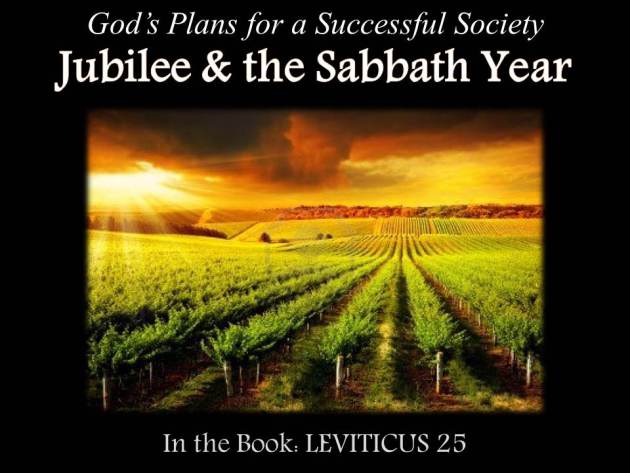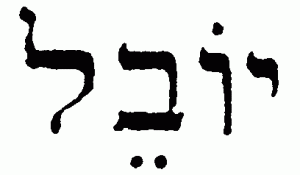The number seven in the Bible has great significance from beginning to end. Beginning in the book of Genesis there are the six days of creation and the seventh day of rest. The creation of the heavens and the earth are the basis of our seven-day week. In the last book of the New Testament we find that there are seven trumpets which usher in the end of an era and the coming of the Messiah to reign for one thousand years (Rev. 8:6). The number seven reveals to us the essence of God’s work in this world and carries with it the meaning of completion, perfection, rest, and God dwelling with His people.
This week’s Torah Portion is one of the shortest among them all. It is basically one chapter, Leviticus 25. The focus of this chapter is the Sabbatical Year and the Year of Jubilee. Both of these years are years of rest based on the number seven. The Sabbatical Year is the seventh year and the year of Jubilee is the year after seven times seven, the fiftieth year. Just as the weekly Sabbath is a day of rest so the Sabbatical Year and Year of Jubilee were to be years of rest but in a deeper way.
The Sabbatical Year
God commanded Moses to speak to the sons of Israel about the Sabbatical Year (Lev. 25:1-7). The purpose of the Sabbatical Year was to give the land a year of rest (Lev. 25:2). The sons of Israel where not to sow seed in the field during the seventh year. They were also forbidden to harvest and prune their vineyards (Lev. 25:3-4). The main point being that the land should have a rest and that all of the produce that grows of itself both in the field and the vineyard should be available to every person and animal equally. It didn’t matter if they were a son of Israel or not. It didn’t matter if it was an animal or a human being. The seventh year was a year that the crops and produce were not to be worked, gathered, or sold but simply enjoyed by everyone equally (Lev. 25:6-7).
The Sabbatical Year was also to be a year of releasing from debts (Deut. 15:1-6). All debts were to be forgiven in the seventh year. God strictly warned the children of Israel not to be stingy but to be generous, to forgive debts, and to share with those in need:
If among you, one of your brothers should become poor, in any of your towns within your land that the Lord your God is giving you, you shall not harden your heart or shut your hand against your poor brother, but you shall open your hand to him and lend him sufficient for his need, whatever it may be. Take care lest there be an unworthy thought in your heart and you say, ‘The seventh year, the year of release is near,’ and your eye look grudgingly on your poor brother, and you give him nothing, and he cry to the Lord against you, and you be guilty of sin. You shall give to him freely, and your heart shall not be grudging when you give to him, because for this the Lord your God will bless you in all your work and in all that you undertake. For there will never cease to be poor in the land. Therefore I command you, ‘You shall open wide your hand to your brother, to the needy and to the poor, in your land.’ – Deut. 15:7-11
God promised to bless the children of Israel beyond measure if they would obey Him in this; to lend to those in need, to forgive debts, and to be generous. God is generous with us and we should willingly be generous to others.
The Year of Jubilee
Beyond the Sabbatical Year every seven years, the sons of Israel were to count seven sabbaths of years, forty-nine years. Then on the tenth day of the seventh month, on the Day of atonement, they were to sound the ram’s horn to mark the fiftieth year and proclaim liberty or release throughout the land to all of its inhabitants (Lev. 25:8-10). The Year of Jubilee was to be a sabbatical year which also allowed for the returning of land to its original owner: “It shall be a jubilee for you, when each of you shall return to his property and each of you shall return to his clan” (Lev. 25:10).
The Year of Jubilee provided for a return of each man to the land of his inheritance. All debts were cleared and everyone had the opportunity to start fresh with a clean slate. Once in fifty years God provided a year of freedom to start over. The year of Jubilee went beyond the release of debts and a return to one’s property. It also included the release of the individual from all personal debts. Sometimes people became so poor and had nothing so they became slaves of others. During the Year of Jubilee all debts were cleared and a slave would be released (Lev. 25:35-41).
Who Owns the Land and the People?
Both the Sabbatical Year and the Year of Jubilee were to be continual reminders of the true owner of the Land and the people. God has made it crystal clear regarding who owns the deed to the Land: “The land shall not be sold in perpetuity, for the land is mine. For you are strangers and sojourners with me” (Lev. 25:23). And regarding the children of Israel God has also stated: “For they are my servants, whom I brought out of the land of Egypt; they shall not be sold as slaves. You shall not rule over him ruthlessly but shall fear your God” (Lev. 25:42-43).
Both the Land of Israel and the children of Israel belong to God. God owns it all and He alone determines how the Land and the people should be treated. The law regarding the Sabbatical Year and the Year of Jubilee were not meant to be a burden to bear but rather a safeguard and a periodic reminder that the God of heaven and earth is watching over His Land and His people. God brought the children of Israel out of a land of slavery to set them free to live a life of freedom. The Israelites were to be like God and to declare His freedom every seventh year and every fiftieth year.
The Land and the Sabbath
It is important to note that the Sabbatical Year and the Year of Jubilee are both based on the Israelites entering the Promised Land (25:1). The Land, the Israelites, and the Law of God go hand in hand. According to rabbinical Judaism the practice of the biblical mandate to obey the Sabbatical Year and the Year of Jubilee are only enforced when all the people of Israel are living in the Land. This has not occurred for nearly 2700 years, the time of the First Temple, when the ten tribes of Israel were taken into captivity. Since the captivity of Israel and the return of the exiles from Judah the Sabbatical Year is somewhat followed in the Land of Israel but not fully. The Year of Jubilee has not been observed for the past 2700 years (Lau, Rabbi Israel Meir. Practical Judaism. 1997. p. 147).
Today many Israeli farmers practice a form of keeping the Sabbatical year by “selling the farm” to a non-Jew and operating the farm through this change of ownership. It is more of a formality to be able to say that an Israeli Jew did not own the property during the Sabbatical Year and the farm is worked as normal, although pruning of vineyards and fruit trees is generally not performed.
The Result of Not Keeping the Sabbatical Year
Regarding the Sabbatical Year and the Year of Jubilee along with the rest of the Law, God promised safety and blessing in the Land if the children of Israel obeyed but fear and a casting out of the Land if they did not obey (Deut. 28). God specifically detailed how the children of Israel would be torn from the Land and scattered to the ends of the earth if they did not obey the covenant of their God (Deut. 28:63-64). We have literally seen the fulfillment of this promise and warning throughout history.
The children of Israel struggled to keep the Law of God all of their days. We see this most clearly illustrated by their lack of effort to keep the Sabbatical Year and the Year of Jubilee from the biblical record. God sent His prophet Jeremiah to the people of Judah up until and during the exile of the people to Babylon. God spoke specifically into the circumstances of that day:
Therefore, thus says the LORD: You have not obeyed me by proclaiming liberty, every one to his brother and to his neighbor; behold, I proclaim to you liberty to the sword, to pestilence, and to famine, declares the LORD. I will make you a horror to all the kingdoms of the earth. – Jeremiah 34:17-18
The word for “liberty” in these verses is the same Hebrew word “dror” used in Leviticus 25. God was judging the people for not keeping his Sabbatical Year and for not proclaiming release and liberty both to the land and to their fellow brethren.
God declared that because the children of Israel did not obey His voice and did not keep His sabbaths, among other commands, the Land would remain desolate for a period of seventy years (2 Chronicles 36:20-21; Jer. 25:8-11; Daniel 9:2). The Israelites did not keep the Sabbatical Years for many years and the Land needed to have its Sabbath rest. Seventy years of punishment were allotted to the people for the amount of years that they didn’t keep the Sabbatical Year. This means that for seven times seventy years the Sabbatical Years were not kept. This equals a total of 490 years.
If we calculate 490 years and go back this amount of years dating from the Babylonian exile, which began in 605 BC, we arrive to the year 1095 BC. We can surmise that from even before the beginning of the reign of the kings of Israel that neither the Sabbatical Year or the Year of Jubilee were kept as God intended them. The result was that the people were cast out of the Land and the Land enjoyed its rest while the people became slaves for seventy years.
The Intent of the Year of Jubilee
The word for liberty as used in Leviticus 25:10 is the Hebrew word ״דרור״ pronounced “dror.” The Hebrew word “dror” is rarely used in the Bible. The meaning of the word “dror” is derived from its context. The word “dror” is only used nine times in the Bible. It is used to mean liberty but it is also the name of a bird, the sparrow (Psalm 84:3). We see the word “dror” used to mean liberty or release in its other occurrences as we have seen in Leviticus 25 and Jeremiah 34, as mentioned above. This same word “dror” appears in Isaiah 61:1-2:
The Spirit of the LORD God is upon me,
because the LORD has anointed me
to bring good news to the poor;
he has sent me to bind up the brokenhearted,
to proclaim liberty to the captives,
and the opening of the prison to those who are bound;
to proclaim the year of the LORD’s favor
We all know the words of these verses as they are like music to the ears. These words are words of hope and deliverance. These words proclaim healing of the heart and freedom for those who are bound. Each one of us longs to see these words made a reality in our lives and in the lives of friends and loved ones around us.
These words from Isaiah 61 are the very words that Yeshua read in the synagogue in the town of Nazareth (Luke 4:16-21). When Yeshua read these words from the prophet Isaiah He declared; “Today this Scripture has been fulfilled in your hearing” (Luke 4:21). Yeshua was declaring that He came to bring liberty “dror” and to set people free. And just in case there was any ambiguity regarding whom Yeshua came to set free, He illustrated His point with two examples.
The Jews in the synagogue were in awe of the words that Yeshua was speaking but they were also wondering how this “son of Joseph” would be able to accomplish that which He was proclaiming. Yeshua then reminded the people that during famine of the days of Elijah, God sent Elijah to a foreign woman in the land of Sidon. God provided for this woman during the famine and also used Elijah to raise her son from the dead. And during the days of Elisha God healed none of the lepers in Israel but only the foreigner, Naaman the Syrian (Luke 4:25-27). Yeshua was making a very clear point, that God was concerned not only for the Israelites but also for the Gentiles. The people in the synagogue wanted to kill Yeshua because of these words but he evaded their plot at this time (Luke 4:28-30).
At the Year of Jubilee the Israelites were to proclaim liberty, release of debts, and a release from working the land. The word “jubilee” is actually a transliteration of the Hebrew word “יובל” and is pronounced “yovel.” The word “yovel” means “release” and it is also the word for “horn,” as in a ram’s horn. The word “yovel” is translated from Hebrew to Greek in the Septuagint (a Greek translation of the Old Testament) as “aphesis” meaning release, forgiveness, or pardon. The proclamation of the Year of Jubilee was to be marked by the blowing of the ram’s horn on the tenth day of the seventh month, the Day of Atonement (Lev. 25:9). On this day there was to be a proclamation of liberty, release of debts, and rest for the land (Lev. 25:10).
Yeshua came to proclaim the Year of Jubilee in all its fulness. Yeshua came to proclaim liberty and set the captives free. Yeshua came to release people from the debt of sin that burdened them. Yeshua came to bring wholeness to the lives of broken people. Yeshua came to pardon all of those who transgressed the Law of God. Yeshua came to provide true release by becoming the ultimate atonement for sin. It is only through Yeshua that the favor of the year of the LORD can be known to each and every one of us.
Yeshua came to proclaim liberty and to set men free. We are called to be like God. As God has shown love and mercy to us, we too are to show love and mercy to others. Let us be like God, proclaim His liberty in Yeshua, and release those around us from the debt of money, hatred, jealousy, and envy. Let us be generous and forgive others as He has forgiven us.
Shabbat Shalom!
If you enjoyed reading this article, we invite you to sign up for our weekly Torah Portion commentary on the sidebar to the right.
Torah Portion: Lev. 25:1 – Lev. 26:2
Hafatara: Jer. 32:6-27
Return to Torah Portion Homepage
Copyright Jewels of Judaism. All rights reserved 2015







